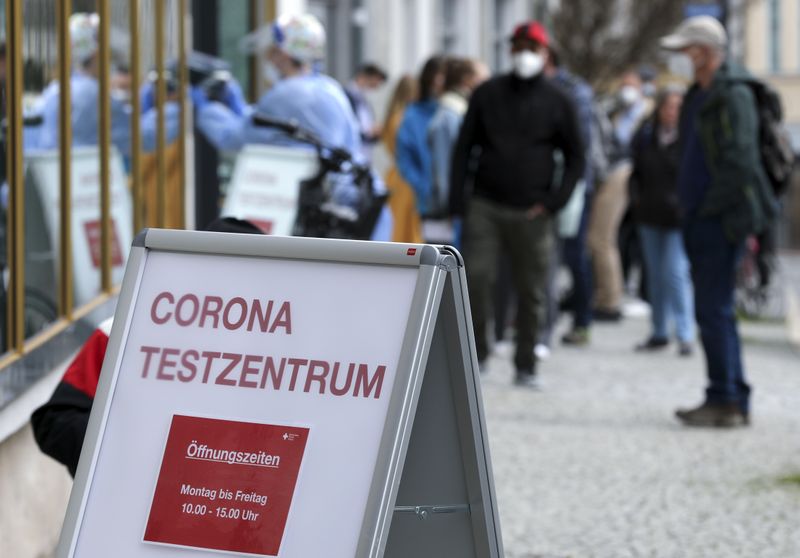By Holger Hansen and Thomas Escritt
BERLIN (Reuters) -Want to take the bus or train in Germany?
You may soon have to provide a negative COVID-19 test or proof of vaccination or recent recovery, as the country becomes the latest in Europe to consider drastic steps to tackle a new surge in cases in the region.
Germany registered yet another record rate of cases over the past week on Monday as more indoor gatherings due to cold weather and flatlining vaccination campaigns turn Europe once more into the pandemic epicentre.
This fourth infection wave is challenging a government in transition, with three parties negotiating to form the next cabinet after September’s inconclusive election.
The centre-left Social Democrats, Greens and pro-business FDP said on Monday they would add harsher measures to their draft law under consideration by the Bundestag (lower house of parliament) to deal with the outbreak.
So-called 3G rules requiring a negative COVID-19 test, or proof of recovery or vaccination should apply to public transport as well as workplaces, according to a policy document by the three parties.
It was unclear how they would be enforced.
“To quickly and forcefully break the fourth wave we have agreed … further rules,” said senior Greens legislator Kathrin Goering-Eckardt on Twitter.
However, she told reporters later there was no agreement on compulsory vaccination in some sectors like care homes, highlighting a division in the would-be government between her party and the SPD on the one hand, and the more libertarian-leaning FDP on the other.
The proposal for new curbs in Germany came as Austria’s government on Monday imposed a lockdown on people unvaccinated against the coronavirus.
Some other European countries require passengers to provide proof of vaccination or tests for long-distance travel on public transport. But it is unclear if any others require it for urban transport.
The Bundestag is due to vote on Thursday on the draft law so it can come into effect before the expiration of Germany’s state of emergency on Nov. 25 which had provided the legal basis for previous pandemic measures.
In addition to nationwide rules, the new law aims to give Germany’s 16 states a toolbox of options they can apply separately, given that the infection rate varies greatly across the country. Higher rates can be detected in regions with the lowest vaccination rates, namely eastern and southern Germany.
But the new draft law excludes measures like school lockdowns and curfews applied during earlier waves of the pandemic, sparking criticism from some policymakers that it diminishes risk perception and flexibility.
Germany’s vaccination rate, at 67%, is among the lowest in western Europe, which could threaten its relatively strong performance to date in tackling the pandemic.
So far it has registered around 1,164 deaths per million people from COVID-19 compared to 1,828 on average for the European Union, according to Nov. 14 data from Our World in Data.
(Reporting by Holger Hansen and Thomas Escritt in Berlin; Additional Reporting by Richard Lough in Paris and Andrei Khalip in Lisbon; Writing by Sarah Marsh, Rditing by Ed Osmond and Richard Chang)























